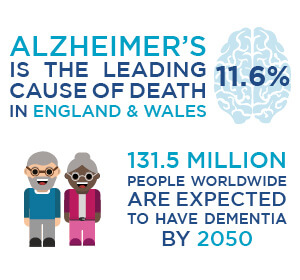Alzheimer’s Disease
Alzheimer’s disease is the most common form of dementia; it’s a progressive disease with symptoms worsening over a number of years [1].
Those with Alzheimer’s have been found to have abnormal amounts of a chemical called acetylcholine in the brain, along with fibres and protein. While it is not known what causes this process to start, the effects are understood to reduce the effectiveness of healthy neurons, eventually resulting in their destruction[2].
A report in 2019, commissioned by Alzheimer’s Society from the London School of Economics and Political Science (LSE), set out estimates for the number of people with dementia and the cost of dementia care in the UK with projections to 2040 [3].
The report found there are currently around 900,000 people with dementia in the UK. This is projected to rise to 1.6 million people by 2040 [3].
209,600 people will develop dementia this year; that’s one every three minutes [3].
Over 42,000 people under 65 have dementia in the UK[3]. This is known as young-onset dementia[5].
More than 25,000 people from Black, Asian and minority ethnic groups in the UK are affected by dementia[3].

Alzheimer’s Disease Facts
- Alzheimer’s disease is the leading cause of death in England & Wales (11.6%)
- It is estimated that 46.8 million people have dementia worldwide [4]
- It is estimated that 131.5 million people will have dementia by 2050 [4]
- Dementia affects 1 in 20 people over the age of 65 [4]
- Dementia affects 1 in 5 people over the age of 80 [4]
- Alzheimer’s accounts for 50-60% of dementia cases [4]
- 900,000 people in the UK have dementia [3].
- 2 million people are predicted to have dementia by 2051 in the UK [5]
- Someone develops dementia every 3 minutes [3][5].
- In 2012/2013 the UK spent £502.8 million on cancer research vs £73.8 million on dementia research [5]
- 7 million people will develop dementia around the world each year [5]
Alzheimer’s Disease, Cord Blood and Stem Cells
There are currently 15 clinical trials investigating the application of stem cells in Alzheimer’s disease[6].
Studies using mice have shown some promise in using stem cells to treat Alzheimer’s. One study found that the mice which had received human umbilical cord blood showed improved cognitive capacities, particularly learning, memory and motor function. The team conducting the study found that monocytes (a type of white blood cell) derived from human umbilical cord blood consumed and cleared the plaque fragments responsible for AD [7].
Scientists in Japan are treating the condition in trial stages by transplanting mesenchymal stem cells from patients’ fat tissue to the bloodstream. Results so far offer hope that a cure could be found in the next few decades.
Induced pluripotent stem cells (iPS) are playing a crucial role in the study of Alzheimer’s disease. Taking skin cells from patients with Alzheimer’s, scientists are able to reprogramme the cells to create neurons. These neurons show some of the key features of Alzheimer’s and could enable scientists to understand better how and why the brain produces the plaques and tangles that cause the disease. This, in turn, can lead to the development of effective therapies being developed [8].
References
-
- https://www.alzheimers.org.uk/info/20007/types_of_dementia/2/alzheimers_disease
- https://www.nhs.uk/conditions/dementia/causes/
- https://www.alzheimers.org.uk/sites/default/files/2019-11/cpec_report_november_2019.pdf
- http://www.alz.co.uk/media/quick-facts
- http://www.alzheimers.org.uk
- https://clinicaltrials.gov/ct2/results?term=stem+cells+alzheimers&Search=Search
- http://alzheimersnewstoday.com/2015/09/18/monocytes-human-umbilical-cord-blood-improve-alzheimers-cognitive-deficits/
- http://www.eurostemcell.org/factsheet/alzheimer’s-disease-how-could-stem-cells-help
- Cell transplantation, 24(11), 2237–2250. https://doi.org/10.3727/096368915X688894
- Alzheimer’s research & therapy, 13(1), 154. https://doi.org/10.1186/s13195-021-00897-2
The information contained in this article is for information purposes only and is not intended to replace the advice of a medical expert. If you have any concerns about your health we urge you to discuss them with your doctor.



